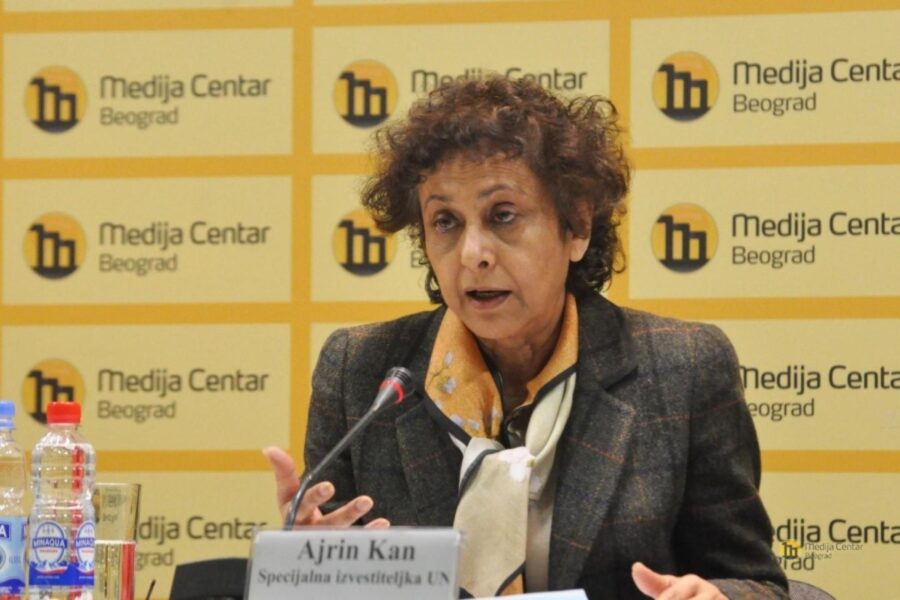
The United Nations Special Rapporteur for freedom of expression and opinion Irene Khan said in a report on Serbia that the Serbian electronic media watchdog (REM) used its powers only against media critical of the authorities and warned of a lack of support for media pluralism.
“On the one hand, the Regulatory Authority of Electronic Media has failed to exercise its authority under the law to restrict smear campaigns and harassment by tabloid media and penalize outlets that are openly engaged in producing and disseminating harmful speech. On the other hand, it has used its power against outlets critical of the Government,” the report said.
It cited the example of N1’s documentary series A Decade in Power which was critical of Serbia President Aleksandar Vucic which the REM said violated a number of provisions on media conduct.
“The Special Rapporteur is alarmed by two reports by the International Election Observation Mission of the Office for Democratic Institutions and Human Rights regarding the Regulatory Authority of Electronic Media. Following the parliamentary elections in 2022, the International Election Observation Mission noted that, despite its mandate to oversee the broadcast media, the Authority had “remained overall passive in the campaign period” and that “the combined impact of unbalanced access to media, undue pressure on public sector employees to support the incumbents, significant campaign finance disparities and misuse of administrative resources” had led to unequal conditions for candidates.11 The International Election Observation Mission raised the same concerns regarding the early parliamentary elections of December 2023, noting that the Authority had “maintained a notably passive approach to regulating media conduct during the campaign”, the report said.
The report also noted that failure “to uphold media pluralism, refusing to sanction harmful speech by certain media outlets, working proactively against outlets critical of the Government and the ruling party and engaging in open conflict with them raise serious doubts about the independence and impartiality of the REM and, more broadly, about its ability to promote and protect media freedom, diversity and pluralism, in line with democratic principles and the international obligations, national laws and policies of Serbia”.
The report expressed concern that the failure of the REM to act against harmful speech by pro-Government sources and outlets could be the result of undue influence on the part of political and commercial interests in Serbia, facilitated by the institution’s weak leadership, legal gaps and a financing model that is based not on the State budget but on fees paid by media service providers. “These risks are recognized in the Government’s Media Strategy, according to which the independence of the REM is not fully ensured in practice, “partly because of regulatory gaps, and partly due to the improper application or the absence of application of the existing regulatory framework,” it added.
According to the UN Special Rapporteur, “populist or tabloid media outlets are major producers and amplifiers of false narratives and hate speech in Serbia”. The report warned that the REM has consistently failed to act promptly and effectively to stop the spread of harmful speech, even when it has reached the level of incitement to violence, hostility and discrimination despite its mandate and the legal means at its disposal.
“It is noteworthy that the Regulatory Authority of Electronic Media did not react to complaints regarding the broadcast either of a live interview with the convicted war criminal Ratko Mladić on a nationwide television programme or of an interview with a serial rapist, which was widely distributed in the tabloid media. Regarding the latter, the Chair of the Council of the Authority reportedly said that she did not understand the “hysteria” that the interview had caused,” the report said.
The Special Rapporteur believes that the failure of the Regulatory Authority of Electronic Media to sanction the demonization of political opponents, human rights defenders and independent journalists in the tabloid media has emboldened the perpetrators, encouraged poisonous smear campaigns to thrive, caused harm to individuals and induced self-censorship, seriously undermining the right to freedom of expression in Serbia, the report said and noted that the REM awarded four of the available five broadcasting licenses to outlets that are known to have consistently violated media regulations, international , ethical and professional standards.
“Given the importance of the regulatory role assigned to the Regulatory Authority of Electronic Media, the Special Rapporteur believes that it is imperative that the Government, in consultation with all stakeholders, including a broad spectrum of civil society and media organizations, as well as the OSCE Representative on Freedom of the Media, assess the independence and effectiveness of the Authority and introduce measures to guarantee its,” the Special Rapporteur’s report said.
UN Special Rapporteur Irene Khan visited Serbia and Kosovo from March 28 to April 6, 2023.
The UN Special Rapporteur noted the strong legal framework for freedom of expression in Serbia but expressed concern that it is being undermined by certain policies and practices, including widespread threats, attacks, hate speech and smear campaigns, online and offline, against journalists, human rights defenders and political opponents, continued impunity for past crimes, slow, ineffective prosecutions and a weak media regulatory body, which is unable to carry out its responsibilities in an independent, effective and competent manner. She urged the Government of Serbia to carry out legal, policy and institutional reforms and demonstrate a stronger, unequivocal political commitment to upholding freedom of expression online and offline, in line with its international human rights obligations.
Author: N1